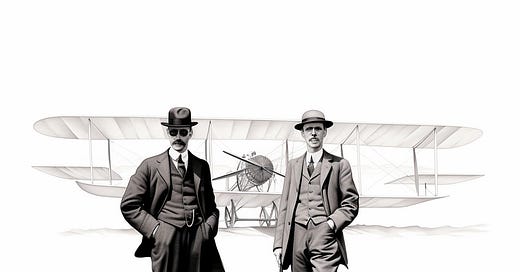The Power of Selective Focus: A Lesson in Prioritizing for Success
The story of the Wright brothers, Orville and Wilbur, is a fascinating chapter in history that epitomizes the essence of focus and prioritization. In the early 20th century, these two brothers from Dayton, Ohio, embarked on a journey to achieve what many considered impossible - powered flight. Unlike many of their contemporaries who were also chasing this dream, the Wright brothers had limited resources and no formal training in engineering or aviation.
What set the Wright brothers apart was their unyielding focus. They homed in on solving the fundamental problem of controlled flight. While others were preoccupied with developing powerful engines, the Wrights understood that the key was control and balance in the air. Their methodical approach involved extensive experimentation with gliders at Kitty Hawk, North Carolina. They meticulously observed the flight patterns of birds, built wind tunnels to test their theories, and were relentless in refining their designs. This razor-sharp focus on the most crucial aspects of flight was pivotal in their success. On December 17, 1903, they achieved the first powered, sustained, and controlled airplane flight, changing the course of history.
This historical example resonates strongly with the idea that being ruthless about what you ignore can lead to remarkable achievements. The Wright brothers' ability to disregard distractions and less critical problems allowed them to channel their efforts effectively.
Drawing from the Wright brothers' story and personal experiences, here are several actionable steps to effectively prioritize:
Identify Key Objectives: Determine what is crucial for your success. Like the Wright brothers focusing on controlled flight, identify the core areas that will have the greatest impact.
Eliminate Lesser Priorities: Actively decide what you can ignore or delegate. Not every task or opportunity deserves your attention.
Concentrate Efforts: Channel your resources and energy into your key objectives. Depth of focus often yields better results than breadth.
Embrace Incremental Progress: Recognize that focusing on a few important goals may lead to slow but steady progress, which is more sustainable and impactful in the long run.
Regularly Reassess Priorities: As circumstances change, be prepared to reevaluate and adjust your focus areas.
In conclusion, I pose this question to you: What are the 'less critical engines' in your life that you need to set aside so that you can soar towards your 'controlled flight'? How might your journey unfold if you choose to focus only on what truly matters?




